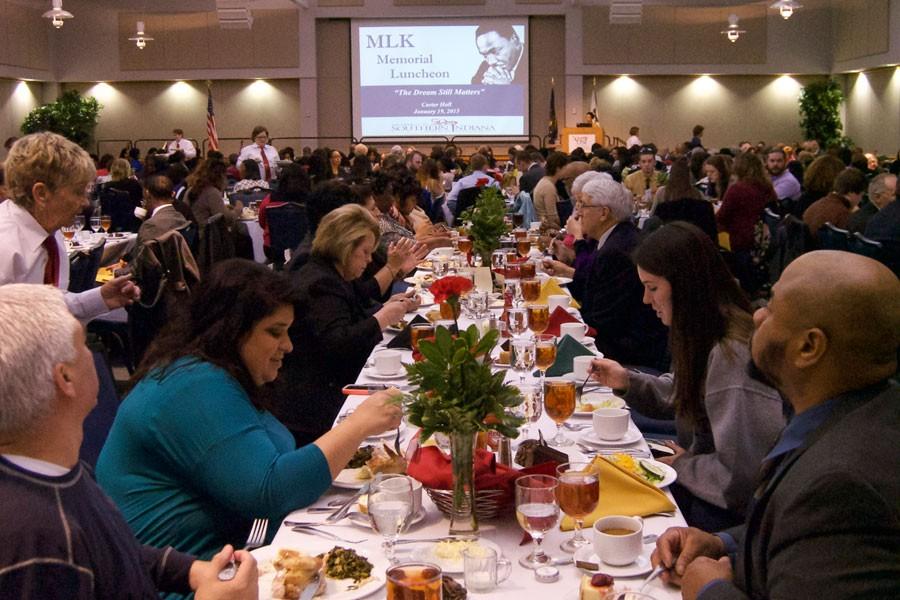‘The man behind the legend’
Keynote speaker to humanize MLK Jr., provide less-known details on activist’s life.
Guests to the Martin Luther King Jr. Luncheon are served their meals before the guest speaker takes the stage during the 2015 annual event in Carter Hall. This year’s luncheon will include guest speaker Major General Barrye L. Price, the first African American to obtain a doctorate from the Department of History of Texas A&M University.
The first time Major General Barrye Price witnessed his father cry was the day Martin Luther King Jr. was assassinated.
At age six, Price didn’t understand the emotion behind his father’s tears.
Now, Price travels the globe educating people on the iconic activist’s life and legacy. He said even the most King-savvy attendees leave his presentations with around 15 new facts they never knew.
Price will speak at the university’s annual Dr. Martin Luther King Jr. Memorial Luncheon at 11 a.m. Monday in Carter Hall in University Center West.
Shaping an activist
The Deputy Chief of Staff, G-1 Army Forces Commander in Fort Bragg, North Carolina, Price was the first African-American to obtain a doctorate from the Department of History at Texas A&M University.
“I am really going to look to get behind the curtain with Dr. King. Much of what we talk about when we talk about (King) is this iconic Christ-deity like man who’s larger than life,” he said. “I want to give his life and his contributions some texture. I want to talk about the man behind the legend of (King).”
Price served on the President and First Lady’s Task Force on “Raising Responsible and Resourceful Teenagers” in 2000, and is the author of the 2001 book “Against All Enemies Foreign and Domestic: A Study of Urban Unrest and Federal Intervention Within the United States.”
The Major General’s doctoral dissertation looked at the riots following Rodney King’s trial verdict and MLK’s death.
“Riots don’t start with the catalytic event, the assassination or the verdict; it really starts long before that,” Price said. “The riot is really the outward expression of discontent.”
When most people reference King, they mention his “I Have a Dream” speech, but there is much more to his life Price wants people to know about.
Price’s speech will cover King’s life from childhood to death and the shaping of King’s persona.
“When you hail somebody in a deity-lie status, I think it really undermines the contributions that he made as a man, as a man with the same fears of most men or most people,” he said.
In a character reference for seminary, King’s father labeled his son as being one of “average intellect,” Price said.
“What’s interesting about King is there is a shy, reserved kid who is really walking in the shadow of a pretty big figure, his father known as Daddy King,” he said.
These seeds were planted in King and events throughout his life shaped him into a the civil rights activist peoples recognize today.
A day to give back
Multicultural Center Director Pamela Hopson said that while the luncheon will feature less entertainment than in the past, the theme of Prices’ speech will provide a more in-depth look at MLK than some previous speakers.
“The purpose of the luncheon is to bring about awareness. Awareness as far as what (King) stood for and, not only what he stood for, but the relevancy today,” Hopson said. “Is it still relevant? Are we still talking about some of those same things that he spoke of when he was on this earth as an activist? Or have we made progress?”
Picking up a newspaper, Hopson said, there’s a clear consensus that civil rights still have a long way to go. A major area in which the country has not progressed far is access to quality education.
“It’s hard to believe in 2016 that you still have some schools whereby they don’t have books or the physical facilities are rundown,” she said.
Hopson said it’s also hard to understand why there is still a homeless population.
“MLK Day is marked as a day of community service, a day of giving back, but that’s only the beginning,” Hopson said. “Some people see that as the only day you can give back, but there are 365 days in a year.”
Hopson said students have said they’d rather catch up on rest that day. To this, she responds, “Where would we be if people like (King) had said, ‘I want to sleep in today?’”
“I think that if people have the day off, and if they haven’t had the opportunity to do so, this is a good day to start to give back to the community and make a difference,” Hopson said.
Major General Price hopes to humanize King so his contributions are viewed as significant with respect to a singular person can make a difference.
“I think people leave with a new understanding of who (King) was as a person, as a man, as a servant of our society,” Price said. “We say that oftentimes ordinary people achieve extraordinary feats and that’s what I hope people will realize.”



